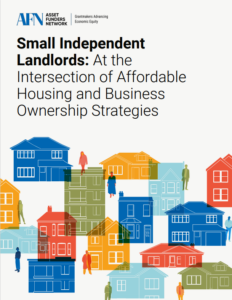 Small Independent Landlords: At the Intersection of Affordable Housing and Business Ownership Strategies
Small Independent Landlords: At the Intersection of Affordable Housing and Business Ownership Strategies
Asset Funders Network
First published November 2023
This brief identifies opportunities to work with Black and other landlords of color to support racial economic justice efforts focused on wealth preservation and renters’ financial well-being.
Small, independent landlords play an important role in the provision of affordable housing. They tend to rent comparatively lower-cost housing to relatively low-income tenants. These landlords themselves tend to own few additional assets and have modest household incomes. This creates both opportunities and risks for their tenants. Landlords with little liquidity prioritize long-term tenants because they struggle to afford the costs of vacancy, preparing their rentals for new tenants, and sourcing them. This helps many low-income renters maintain stability, but it can also increase the barriers to housing security facing Black families, single parents, disabled people, and others.
These landlords effectively function as local small businesses within every housing market, meeting one of tenants’ essential needs, spending money on local services, and often reinvesting net income into homes in the same community. Yet very few small, independent landlords are incorporated, have additional investors, or make more than modest returns, so they are generally left out of the nation’s robust networks of support and financial services for small business owners.
Download Resource